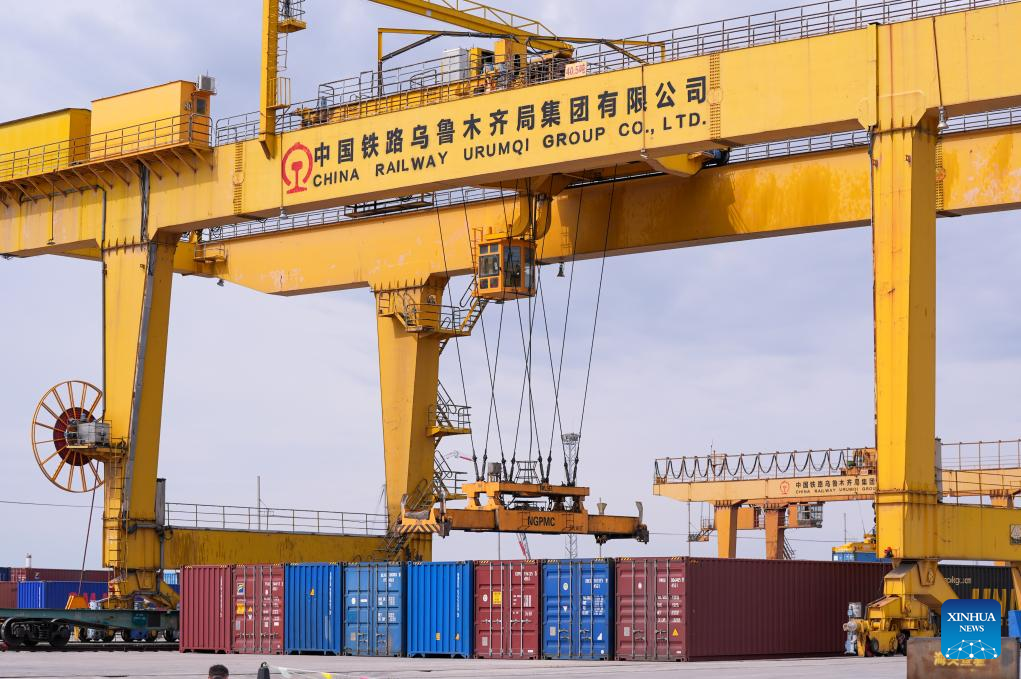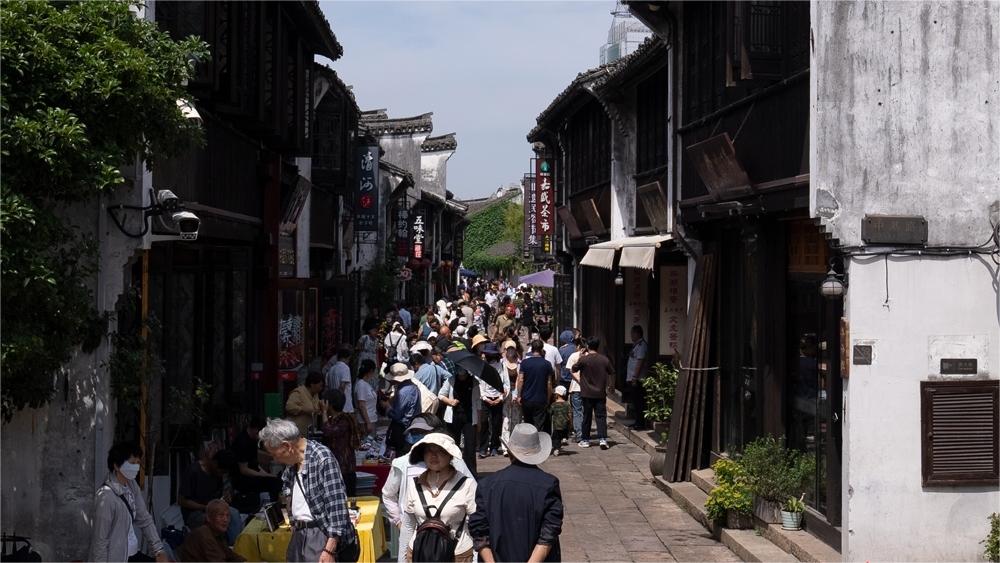China-Europe freight trains fuel prosperity in border city

A frame crane handles containers at the load-transfer yard of the Horgos Port in Horgos, northwest China's Xinjiang Uygur Autonomous Region, May 29, 2024. (Xinhua/Wang Fei)
URUMQI, June 1 (Xinhua) -- With the continuous advancement of the Belt and Road Initiative, Horgos, a border city located in northwest China's Xinjiang Uygur Autonomous Region, has developed closer ties with the world, with the launch of the China-Europe freight trains injecting new vitality into this inland port city.
Since the flag-off of the first China-Europe freight train at Horgos station in 2016, over 36,000 China-Europe (Central Asia) freight trains have passed through Horgos Port.
The annual number of these trains has surged from fewer than 400 in 2016 to over 7,000 in 2022. In 2023, 7,762 trains passed through Horgos, marking a year-on-year increase of 9.8 percent.
Ye Mengting, a staff member at Xinjiang Zhonglian Haitong International Freight Forwarders Co., Ltd., has been busy lately, handling customs clearance procedures.
"Almost every weekday, I go to the Horgos railway port to handle customs clearance for goods traveling via China-Europe freight trains," Ye said. Her job involves checking various details on the international consignment notes, which include information about the consignor and consignee, the name and quantity of the goods, the transport route and the costs.
Each container corresponds to an international consignment note, ensuring the goods are properly managed and tracked during transportation, she added. Ye's company handles about 200 consignment notes daily.
Ye has been working in this role for more than two years and has seen a significant improvement in the efficiency of handling customs clearance.
"With improved customs clearance and streamlined procedures, such as paperless clearance and online operations, we can complete the process in just one to two hours," she said. Previously, she could only handle the paperwork for up to two trains a day, but now she can complete the procedures for about four trains every day.
Yu Rong, deputy director of the safety production command center at Horgos Station, China Railway Urumqi Group Co., Ltd., highlighted the dramatic increase in train traffic.
Initially, the port handled only two trains per day, carrying a few hundred tonnes of mainly clothing and footwear. Now, it handles over 20 trains every day, transporting more than 10,000 tonnes of goods, with over 200 different types of products, Yu said, adding that the destinations of the trains have also expanded to 18 countries.
"Over the years, the China-Europe freight trains have steadily advanced, mirroring the rapid development of this burgeoning port," he said.
"Handling more China-Europe freight trains at our station not only means increased cargo checks but also translates to higher earnings," said Yelrik Duysanbe proudly, a grassroots worker at the station.
Adilya Saidullaev, hailing from Kazakhstan, echoed similar sentiments as she recounted how she has benefited from the China-Europe freight trains.
Having ventured into business in Horgos back in 2016, her company has witnessed remarkable growth over the ensuing years. This success has enabled her to establish multiple duty-free shops and banks at the China-Kazakhstan Horgos International Border Cooperation Center, the first cross-border cooperation zone established between China and other countries.
The China (Xinjiang) Pilot Free Trade Zone (FTZ), established in November 2023, is the first in China's northwestern border regions and the country's newest. Covering approximately 180 square km, the pilot FTZ encompasses areas of Kashgar prefecture, Urumqi and Horgos. The China-Kazakhstan Horgos International Border Cooperation Center is now a crucial part of the pilot FTZ's operations in Horgos.
"Our products are seamlessly transported through the China-Europe freight trains, a service that is more cost-effective than air and road transportation. This has significantly bolstered our business operations at the cooperation center," Saidullaev said.
Thanks to the cooperation center, many Chinese visitors can purchase products here without traveling to Kazakhstan, she added.
Yang Jiayi has been working in international freight forwarding in Horgos for nine years, specializing in the export of new energy vehicles (NEVs) in recent years. This year, his company's NEV export business has seen a significant increase compared to last year. So far, his company has provided freight forwarding services for over 9,000 NEVs, which are transported to Central Asian and European countries via the China-Europe freight trains.
"As a local, I have witnessed the rapid development of the China-Europe freight trains in Horgos firsthand," Yang said.
"Over the years, I have seen the establishment of the station and its expansion. The local government has also continued to revise its investment policies, attracting talent from diverse locations and boosting local employment," Yang said, adding that such moves have not only facilitated local development but also accelerated his career growth.

Staff members work inside the production safety command center at Horgos Station, China Railway Urumqi Group Co., Ltd., in Horgos, northwest China's Xinjiang Uygur Autonomous Region, May 29, 2024. (Xinhua/Wang Fei)

A visitor shops at a duty-free shop in Horgos, northwest China's Xinjiang Uygur Autonomous Region, May 29, 2024. (Xinhua/Wang Fei)
Photos
Related Stories
- Commentary: "Forced labor" or veiled protectionism?
- Centennial journey: National brands at World Expos
- Xinjiang achieves notable human rights development: experts
- Hit TV series puts Xinjiang's millennia-old nomadic culture under spotlight
- Commentary: "Forced labor" smear killing jobs, ruining lives of Xinjiang ethnic minorities
Copyright © 2024 People's Daily Online. All Rights Reserved.









